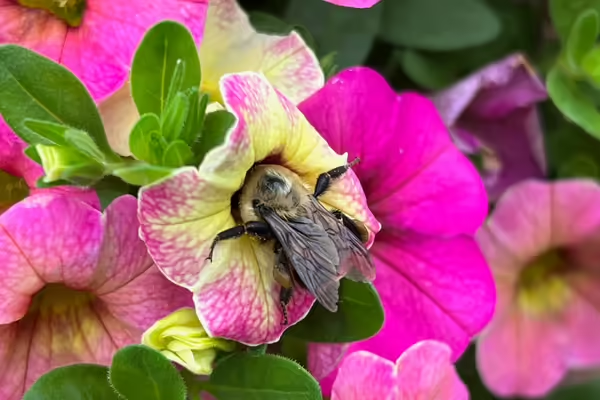
Beyond filling our plates, pollinators play a hard-to-detect but crucial role on a global scale. While it’s easy to focus on their contribution to our food supply, with 35% globally relying directly or indirectly on their work, their impact stretches far wider.
Across the United States, over 150 crops, from juicy berries to crunchy nuts, depend on the tireless work of pollinators. Their economic value is staggering, generating $29 billion within the US alone and contributing $235-$577 billion globally.
But these tiny heroes are facing a crisis. Headlines feature their well-documented decline, one that has likely not been driven by a single factor. Instead, scientists agree that a combination of factors, including pesticide exposure, habitat destruction, pest pressure, disease, invasive species, and climate change, has dramatically impacted pollinator health.
One local program, developed by volunteers in Champaign, Ford, Iroquois, and Vermilion counties, significantly impacts pollinator populations across Illinois.
“Master Gardeners and Master Naturalists understand pollinators’ critical role in our ecosystem,” says Horticulture Educator Ryan Pankau. “That’s why they created the Pollinator Pockets program, a powerful grassroots initiative helping restore regional pollinator habitats. It’s a scalable solution that anyone can be a part of.”
Aiming to empower individuals to become stewards for pollinators, our user-friendly provides information and resources to help homeowners plan their pollinator habitat. From educational videos and tips on how to plant the perfect plant arrangement for pollinator support to actual example designs and reference materials about pollinator-friendly plants, our website is helping homeowners create pollinator habitat pollinator-friendly plants; our website is helping homeowners create pollinator habitats every day.
Homeowners and gardeners can plant confidently with this expert knowledge and valuable resources. And plant they did. Since its inception in 2016, the program has rapidly grown in popularity, reaching the impressive milestone of 500 pollinator pockets registered across six states.
“Year over year, the Pollinator Pocket website and the program grow in success, leading the state in clicks, resulting in some impressive statistics,” says Website Editor and Communications Coordinator Jake Keister. “We’re excited to start working with the state communication team to bring the program to even more people in the coming year.”
“The program has been used as an outreach tool and conversation starter, spreading the word about pollinators’ ongoing plight while offering a positive solution: plant more pollinator habitats!” says Pankau.
The success of the Pollinator Pockets program proves that local action, driven by dedicated volunteers and accessible resources, can make a tangible difference in tackling environmental challenges.
Written by Mindy Jefferson.
Photo caption: A bee stuffs itself in a flower. Photo by Master Gardener Ann Tice.
Illinois Extension leads public outreach for University of Illinois by translating research into action plans that allow Illinois families, businesses, and community leaders to solve problems, make informed decisions, and adapt to changes and opportunities. Illinois Extension is part of the University of Illinois Urbana-Champaign College of Agricultural, Consumer and Environmental Sciences.